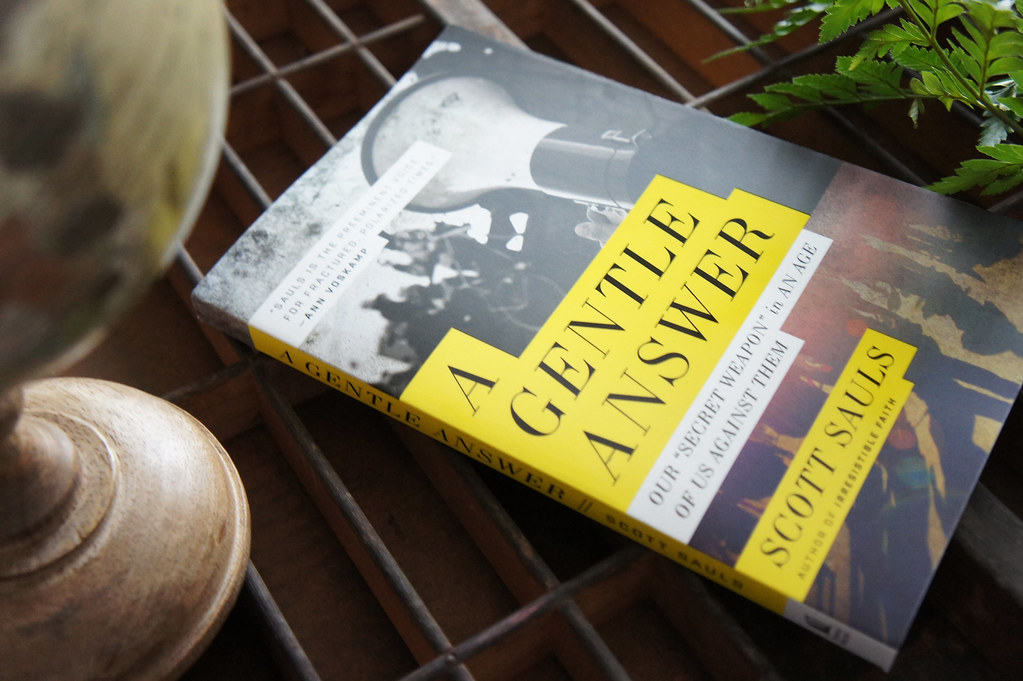I have said often that books by Scott Sauls should be in the hands of every single Christian without exception. Scott is the preeminent voice for fractured, polarized times. No voice speaks with such fresh hope, clarifying wisdom, rooted orthodoxy, all from a posture of unifying grace. Tim Keller has described Scott’s latest offering, A Gentle Answer: Our ‘Secret Weapon’ in an Age of Us-Against-Them, as “a great, highly practical volume that points us to the tenderness of Jesus—‘a bruised reed he will not break.’” Very few pastors or theologians have more spiritually formed our family than his, and his every word is read under our roof. And very few books could change the conversation around our office watering holes, our family dinner tables, and across our aisles and fences across the globe like this one. For these reasons, it gives us joy to welcome our friend, Scott Sauls, to the farm’s front porch today…
The first time God ever said, “It is not good,” He spoke the words into paradise. Before the serpent hisses his first temptation, before humanity fell into sin, before any curse was declared over man, woman, or creation, it was established that something was not good in God’s otherwise very good world.
“It is not good for the man to be alone,” God said. “I will make a helper suitable for him” (Genesis 2:18).
God took swift action while Adam was fast asleep, creating a She to complete the He.
When he first laid eyes on Eve, Adam erupted into a poetic love song. She was flesh of his flesh, bone of his bones, and a helper corresponding to him.
About that word helper. Eve was not some sort of weak or lesser-than “little helper” to Adam. Indeed, she was quite the opposite.
She was not his employee to boss around, his personal assistant to do his bidding, or his sex object to gratify his libido. She was a different, more dignified and necessary kind of helper, in the same way that God is our helper.
“Behold, God is my helper; the Lord is the upholder of my life” (Psalm 54:4).
The word the Psalmist used to describe God is the same word God used to describe Eve. The word is ezer, which means a helper who provides for Adam a strength that he lacks on his own.
Hers is a strength that upholds and completes him, a strength that helps him flourish and not languish.





One of my favorite movie scenes is when the wife in My Big Fat Greek Wedding says that in marriage, the husband is the head but the wife is the neck, and the neck turns the head.
That sounds about right to me.
As a man, I represent half of the image of God in my gender.
Without the voice, influence, and leadership of the She’s in my life, I would be much less of a man than I am.
Even the Apostle Paul, an unmarried man, surrounded himself with women. There was Phoebe the deaconess, Lydia the businesswoman, Priscilla the theologian, Junia the apostolic colleague, and many others.
Likewise, the unmarried and perfect God-man Jesus welcomed into His circle the sisters Mary and Martha, Mary Magdalene, the bleeding woman, the woman caught in adultery, and the penitent prostitute.
Women were chosen as the first eyewitnesses of his resurrection. They were then sent to tell his doubting disciples—the men (!)—that the Lord was risen.
The church where I serve includes as many women as it does men in leadership. I seek out the female perspective for wisdom I do not possess on my own.
I learn from books written by women, listen attentively and often to teaching by women, sing hymns and songs written by women, and learn from the correction of women on a regular basis.
In the Bible, I’m drawn to Hagar, Hannah, the persistent widow, the poor generous widow, Anna the prophetess, and the Virgin Mary, to name just a few.
Why? Because I need all kinds of help from the She’s…help to see more clearly the world as it is, people as they are, and God as He is.
Like Adam, I am lesser and also a bit lost without the female perspective. Maybe the same is true in the reverse? I suspect that it is.
Jesus had His female companions, and so did Paul. Israel had Deborah, Esther, and Ruth. Timothy had his mother. Augustine had his mother. Luther had Katie. King had Coretta. Keller has Kathy.
As journalist David Brooks recently said, behind virtually every great man in history, there has been a great woman.
Similarly, history boasts of many great women who led from the front. Mother Theresa, Rosa Parks, Lottie Moon, Sojourner Truth, Amy Carmichael, Corrie Ten Boom, Eleanor Roosevelt, Flannery O’Connor, and Margaret Thatcher. More recently, Joni Eareckson Tada, Beth Moore, Jenny Yang, Ann Voskamp, Christina Edmondson, and Christine Caine come to mind.
In my daily life, there is Patti Sauls, without whom I would suffer not only to preach the gospel (my primary calling), but also to believe it. One Wednesday before Easter, we were on a dinner date.
In a moment of weakness, I started tearing another person down through gossip. After I finished assassinating this person’s character, Patti looked at me and gently responded, “Scott, I love you, and you shouldn’t have said any of that.”
This faithful word from the She in my life sent me into a crisis. I abhor sin of gossip, and yet so easily fell into it.
Gossip is pornography of the mouth, a lustful fantasy in its own right—a cheap thrill at another’s expense, an objectifying of their humanity, an assault on their dignity, while making zero commitment to them. All for a cheap, self-serving, shameful rush.
Patti’s correction sobered me, so much that I fell into shame and self-loathing. How can I call myself a man, much less a man of God? Preaching and tearing down someone else’s good name with the same tongue? How can that be? I am a man of unclean lips!
I asked Patti if she thought I was a fraud. Should I quit the ministry?
Then, the She who knows me best gently affirmed that indeed, my behavior was dark.
Then she spoke of the deceitful Jacob, the adulterous David, the murderous Paul, and the abrasive Peter. All were flawed, sinful men through whom God is still speaking today.
She reminded me of how I preach both sides of the gospel to others—that we are all busted-up sinners without hope except for the mercies of God, and that God has met that need richly through Jesus.
We are at the same time in desperate ruins and graciously redeemed.
“Scott,” she said, “now is the time for you to preach the second part of the gospel to yourself. You are a mess. But the darkness in you can never outcompete the grace of God.”
My sermon that Easter was stronger and more fruitful than any other Easter sermon I’ve preached.
This was not in spite of my moral failure a few days prior, but because of it. For a moment, I saw myself as the chief of sinners.
I lost my strut and recovered my limp, as every preacher must. But to rise out of a defeated and self-loathing place, it also took the tender, tenacious voice of a She to remind me of a grace that says to my limp, “Rise and walk.”
Because of Her, I was made more ready to tell others that in Him, they can rise and walk, too.
It is not good to be alone.
And it is good—very good, in fact—for the He to receive strength and help from the She.
Scott Sauls is senior pastor of Christ Presbyterian Church in Nashville, Tennessee, where he lives with his lovely wife, Patti, and daughters, Abby and Ellie. He blogs regularly—seriously bookmark him—and can be found being humble light on Twitter, Instagram, and Facebook.About A Gentle Answer, Amanda Williams and Raechel Myers of She Reads Truth have said of their own pastor’s latest work, “With the humility of a fellow student and the kindness of a trusted friend, Scott examines nuanced issues of anger, forgiveness, and criticism in the clarifying light of the gospel.”
I humbly concur. A Gentle Answer is a roadmap, first into the gentle heart of Jesus, and then into a world that is aching for a gentle answer to bring relief from the hostility and noise. This is an absolute must-read that I cannot recommend highly enough.













